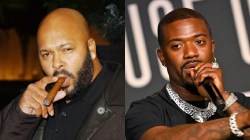Prior to Soul Rebel’s August release, John Givez published a post to his blog entitled “Dear CHH” warning listeners that he was not going to follow the typical mold of the Christian Hip Hop subgenre. “I want you to listen to my music & think about all the kids out there that you would ‘shut up’ because they aren’t up to your standard (that you so effortlessly call Gods). God didn’t give me a platform to be perfect. He gave me a platform to be genuine.” King’s Dream Entertainment and Dream Junkies are known for creating projects that push religious boundaries and focus on positive messages through excellent art. Soul Rebel continues that trend and is far from any album that usually gets the CHH nod. The album skirts CHH definition with a stylistic blend of Rap and R&B and content that swirls through both the earthly and heavenly realms. The 15-track project carries its theme fluidly from the dizzying intro to the anthem-like “Rebel Credits.”
Although the typical Rap fan might not see Soul Rebel as anything especially groundbreaking, the fact that Givez was able to create a project that moves the needle on both the side of the religious and of the secular. The Oceanside, California rapper does not pretend to have all the answers. What he does have is a captivating story.
The most obvious deviation from the Christian Hip Hop label is the project’s use of profanity, something that the average listener wouldn’t bat an eye at, but according to Givez’ purpose, this is important. The rapper directly confronts legalism in the church when the opening bars of the infectious “Elementary Trill” go “Daddy never raised me up to call myself a nigga / Prolly picked that up in elementary I figure.” This seems to be a direct challenge to the self-righteous, daring them to judge him even after he offers the context of his background.
The raw storytelling of questioning religion is something many artists have yet to perfect and Givez gives a solid effort at trying. The song “Chapter 29” signifies Givez’s transition after reading in Jeremiah 29 that God has a plan for him despite all of the hardships he’s been through in his life. “I think my soul’s lost somewhere between captivity and captivation / My situation and (shit) I’m facing is complex / Excuse my language, but don’t take this here out of context / You in my room when I do what I do to get by / God, I hope you don’t mind if I read this Bible and get high like that song ‘Kush and Corinthians’ say / Will you take me as I am? I can’t be nobody else but my damn self.” His variations of tone and speed eloquently show his internal wrestling to submit to a God that he has doubted one too many times.

AD LOADING...
Other tracks debate the value of prayer. “Playaz Inheritance” expounds on the contrast between living for earthly pleasures versus a higher calling. “Before I meet my maker, before He take my soul, I wanna be a player, I take my game to pro, somebody call my mama and tell her pray some more, I gotta get these dollars, that’s just the way it goes,” Kiki and Kyra De’nae sing on the song. A similar sentiment appears on “A Playaz Change of Heart,” which shows the rapper tired from the fast life. “Momma, I don’t wanna be a playa, I got too many other problems / Momma if you would say a prayer, I hope the man up there can solve ‘em / I’ve been on the same ol’ same ol’ things yeah, and I don’t see no way to stop it,” Givez croons.
In contrast to the standards of Christian Hip Hop, it is common for any rapper to give a shout out to God in the mainstream. Many artists exhibit wrestling with the notion of good and evil, the spiritual and the worldly. What Givez brings to the game is a sense of peace. He has fought the battle and continues to have his struggles. But he has chosen to leave his former fantasies of the fast life in exchange for what he has found to be the true joy. Givez scratches the surface of something much deeper that might leave the listener wanting more. He touches on personal issues and battles but comes short of fully unpacking the faith of society as a whole.
Perhaps the purpose of the album is best defined in the song “Generation (Y)” when the Soul Rebel himself says “My confidence was confiscated by the complicated and convoluted culture we living in… I’m not your Malcolm X, Farrakhan or Martin Luther, but I’m down to bring the truth to a beautiful generation.” On this album, Givez admits he is not perfect and paints pictures of his experiences, the good and bad, to show a greater calling than his “higher education” of “getting high with no school” that he describes in “Johnny Law (Green Light).”

AD LOADING...
Overall, Soul Rebel is not something that has never been heard before. The sound of the album does follow today’s trends of 808s, hi-hats, and R&B melodies. It is fairly obvious who Givez’s influences are. The average Rap fan will be able to pick them up easily enough and this does take away from the originality of the project. However, Givez does a commendable job of allowing those artists to do just that: influence. He is only 23 years old and has plenty of time to continue grooming his own sound and brand.



